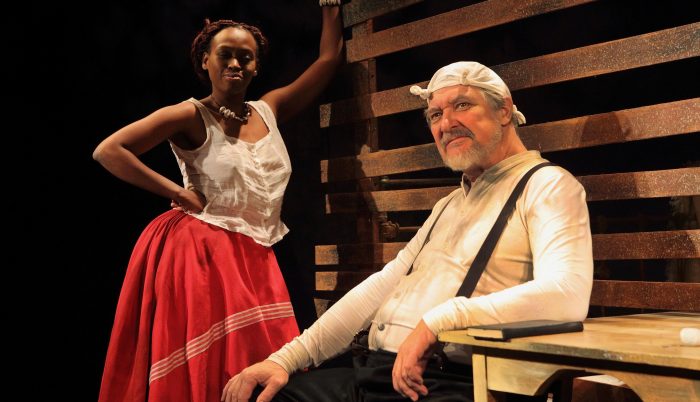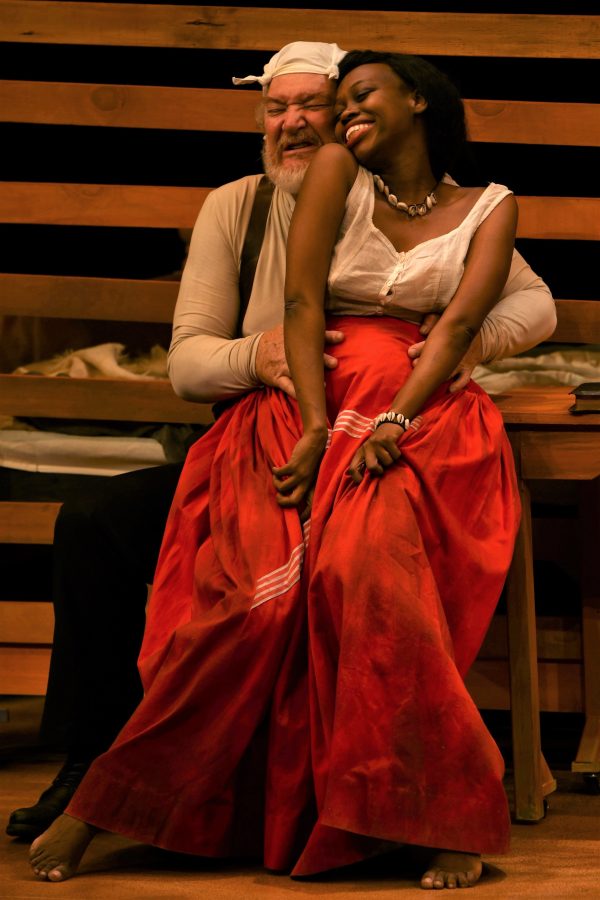
Desire Under the Elms by Eugene O’Neill. EgoPo Classic Theater, October 2018.
The 2018-19 season of EgoPo Classic Theater is devoted to the theater of South Africa. This genre has been neglected by American companies and, therefore, is good to see as EgoPo continues its tradition of producing themed seasons.
The year’s most-familiar play will be Master Harold and the Boys by Athol Fugard about a white family in 1950 in South Africa, when apartheid (separateness) was the law of the land. Opening the mainstage season at the Latvian Society Theater will be A Human Being Died That Night, an account of the atrocities committed by the South African police in the apartheid era.
Also on the schedule is Three Sisters Two, imagining Chekhov’s Russian characters twenty years later with the Bolsheviks now in power. Playwright Reza de Wet used post-revolutionary Russia as a stand-in for her own country to ask how colonial powers respond when they enter a new era with different people in charge. Egoli will be a look into the world of miners in South Africa, who struggle with racial inequality and poverty.
The season opener is an imported production by Fred Abrahamse and Marcel Meyer from South Africa of Eugene O’Neill’s Desire Under the Elms. This is a venture shared by EgoPo with Drexel University’s College of Media Arts and is in the Mandell Theater on the Drexel campus in West Philadelphia.
The importation of this staging is positive because it gives us a look at the accomplishments of a cultural organization in South Africa’s modern era. Director Abrahamse has moved the locale from O’Neill’s New England to Africa’s cape.
The major innovation of this production is its stripping away of family and community to focus entirely on a love triangle. The woman, Abbie, is played here by the black actress Mbali Bloom but there’s no reference to race. The fact that a white man marries a young black woman is never mentioned. She wears bright-colored clothing associated with people known as Xhosa at the end of the 19th century, but this staging misses an opportunity and makes no reference to anything interracial.
(Freedom Theatre in 2001 produced Desire Under the Elms with an all-black cast directed by Walter Dallas.)
O’Neill’s 1924 tragedy portrays a rivalry between father and stepson over the same woman but, more than that, it’s about land, and the desire of people to own and develop their own property. Before the 1990s, the laws in the Union of South Africa prohibited blacks and “coloured” (racially-mixed) from owning land. That, plus racial segregation and disenfranchising black people, allowed the white minority to cling to power. I’d be interested in a staging of Desire Under the Elms which spotlighted that topic, but this production doesn’t.
Ephraim (Robin Smith), a 75 year-old farmer, tries to make something of the stony soil which he inherited, or stole, from his late wife. His son Eben (Marcel Meyer) is resentful. When papa brings home a new, young wife, Eben lusts for her and she responds. Abbie and Eben produce a child that Ephraim thinks is his. Meanwhile, Eben thinks of his relationship with Abbie as his mother’s revenge against his father. O’Neill’s script shows the two young ones actually falling in love, and changing. This production doesn’t convince us of that true love.
Bloom is captivating as Abbie. Smith gives Ephraim some lighter, humorous moments which added dimension to the part. Meyer, as Eben, is a more-or-less standard stud.
The set by Abrahamse is a sparse lean-to house. The production has an original score by Charl-Johan Lingenfelder and detailed period costumes by designer Marcel Meyer.
EgoPo has expressed the hope that this season will reinforce the need for understanding and empathy in America as it shares the work of South African writers and creators with Philadelphia audiences.
Photo by Kylie Westerbeck:
